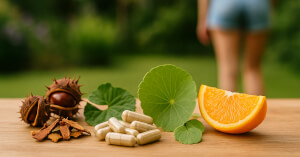
Horse Chestnut
Horse Chestnut is used to improve circulation, reduce varicose veins, and alleviate symptoms of chronic venous insufficiency.
Horse Chestnut (Aesculus hippocastanum) is a tree native to Europe whose seeds have traditionally been used to support vein and circulatory health, particularly in cases of varicose veins and chronic venous insufficiency.
The active compound, aescin, may strengthen blood vessel walls, reduce swelling, and improve circulation. It is typically used in standardized extract form to ensure safety and efficacy.
Horse chestnut is commonly taken for leg swelling, vein discomfort, and vascular tone. While supported by several clinical trials, raw seeds or unprocessed forms should be avoided due to toxicity.
Other names & forms of Horse Chestnut supplement : aesculus hippocastanum, horse chestnut seed, horse chestnut extract
Possible Benefits
Horse Chestnut contains aescin, a compound that strengthens capillary walls and reduces fluid leakage, supporting vascular health.
- Helps maintain healthy Blood Flow & Circulation by improving vein strength and reducing varicose vein symptoms.
- May alleviate mild Pain Relief associated with chronic venous insufficiency.
- Contributes to Skin Health by reducing swelling and inflammation in the legs.
Side Effects
Horse Chestnut can support circulation, but keep an eye out for mild effects as your veins adjust. Watch for:
- Occasional gastrointestinal upset, nausea or mild diarrhea, especially when taken on an empty stomach
- Mild headache or dizziness in sensitive individuals
- Possible skin rash or itching, particularly in those with nut allergies
- Temporary muscle cramps or weakness in rare cases
- Rare allergic reactions, facial swelling or hives, in highly sensitive users
Interactions
Possible interactions include:
- Venotonic and vascular drugs: Horse Chestnut’s aescin may enhance effects of pentoxifylline or supplements like Bilberry, improving circulation, monitor for hypotension.
- Anticoagulant and antiplatelet agents: Its mild antiplatelet properties can add to warfarin or Garlic, increasing bleeding risk, monitor INR.
- Diuretics: Horse Chestnut may potentiate diuretic drugs such as furosemide or Dandelion Root, affecting fluid balance, watch electrolytes.
- Topical medications: When using topical Horse Chestnut extracts, avoid occlusive dressings over sites treated with corticosteroid creams to prevent enhanced skin absorption.
Precautions
Before adding Horse Chestnut to your regimen, verify you’re not in any of these higher-risk categories. If you are, check with your healthcare provider:
- Pregnant or breastfeeding women: Limited safety data; best to avoid until more information is available
- Individuals with bleeding disorders or on anticoagulants: May increase bleeding tendency; use with caution
- People with liver or kidney impairment: Metabolism and excretion may be affected; monitor function if used long-term
- Those with nut allergies: Risk of allergic reaction; avoid
- Patients scheduled for surgery: Discontinue at least two weeks prior, potential bleeding risk
Studies
These studies provide scientific insights into Horse Chestnut benefits:
A 2011 Cochrane review of horse chestnut seed extract found it significantly reduces leg edema in chronic venous insufficiency versus placebo .
A 2013 randomized, double-blind trial in 160 CVI patients showed 500 mg/day aescin for 8 weeks improved venous refilling time by 30% versus 10% with placebo.
A 2009 crossover study reported no significant benefit of topical horse chestnut gel on varicose vein pain compared to placebo .
Despite anti-inflammatory claims, no RCTs have evaluated aescin for deep vein thrombosis prophylaxis or arterial insufficiency.
Disclaimer: This page is for educational purposes and does not replace medical advice. If you're pregnant, have a condition, or take medication, speak with a qualified professional.
Related Articles








